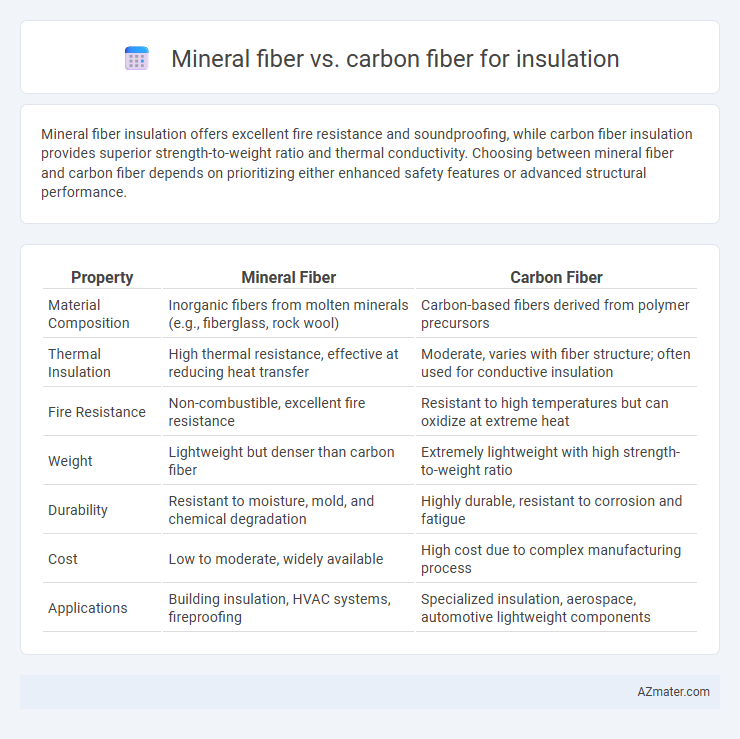Mineral fiber insulation offers excellent fire resistance and soundproofing, while carbon fiber insulation provides superior strength-to-weight ratio and thermal conductivity. Choosing between mineral fiber and carbon fiber depends on prioritizing either enhanced safety features or advanced structural performance.
Table of Comparison
| Property | Mineral Fiber | Carbon Fiber |
|---|---|---|
| Material Composition | Inorganic fibers from molten minerals (e.g., fiberglass, rock wool) | Carbon-based fibers derived from polymer precursors |
| Thermal Insulation | High thermal resistance, effective at reducing heat transfer | Moderate, varies with fiber structure; often used for conductive insulation |
| Fire Resistance | Non-combustible, excellent fire resistance | Resistant to high temperatures but can oxidize at extreme heat |
| Weight | Lightweight but denser than carbon fiber | Extremely lightweight with high strength-to-weight ratio |
| Durability | Resistant to moisture, mold, and chemical degradation | Highly durable, resistant to corrosion and fatigue |
| Cost | Low to moderate, widely available | High cost due to complex manufacturing process |
| Applications | Building insulation, HVAC systems, fireproofing | Specialized insulation, aerospace, automotive lightweight components |
Introduction to Insulation Materials
Mineral fiber insulation, composed of materials like fiberglass or rock wool, offers excellent thermal resistance and fire retardancy properties, making it a popular choice for building insulation. Carbon fiber insulation, while less common, provides superior strength-to-weight ratio and enhanced durability, often used in advanced or specialized applications requiring lightweight performance and thermal stability. Both materials contribute significantly to energy efficiency and soundproofing, with mineral fiber favoring cost-effectiveness and carbon fiber excelling in high-performance environments.
What is Mineral Fiber Insulation?
Mineral fiber insulation, also known as rock wool or stone wool, is made from natural or synthetic minerals such as basalt or slag, offering excellent thermal and acoustic insulation properties. This material is highly fire resistant, non-combustible, and provides soundproofing benefits due to its dense fibrous structure. Mineral fiber insulation is widely used in residential, commercial, and industrial buildings for energy efficiency and fire safety compliance.
Understanding Carbon Fiber Insulation
Carbon fiber insulation offers superior thermal resistance and durability compared to mineral fiber, making it ideal for high-performance applications requiring lightweight and strong materials. Its unique composition allows for enhanced heat retention and resistance to moisture, reducing energy loss and improving overall efficiency in building insulation. Unlike mineral fiber, carbon fiber insulation also provides improved structural integrity, making it suitable for advanced industrial and aerospace uses.
Thermal Performance Comparison
Mineral fiber insulation offers thermal conductivity values typically ranging from 0.03 to 0.04 W/m*K, providing reliable resistance to heat flow and effective energy efficiency. Carbon fiber insulation, while less common, can achieve lower thermal conductivity rates around 0.02 to 0.03 W/m*K, resulting in superior thermal performance and enhanced insulation properties. The higher thermal resistance of carbon fiber materials supports better long-term temperature regulation in buildings compared to conventional mineral fiber solutions.
Fire Resistance and Safety
Mineral fiber insulation offers superior fire resistance due to its non-combustible properties, effectively withstanding temperatures above 1,000degF, making it ideal for fire-critical applications. Carbon fiber insulation, while strong and lightweight, is combustible and loses structural integrity under high heat, posing safety risks in fire scenarios. Choosing mineral fiber enhances building safety by providing robust fire barriers and reducing smoke toxicity compared to carbon fiber materials.
Mechanical Strength and Durability
Carbon fiber insulation exhibits superior mechanical strength compared to mineral fiber, with tensile strength often exceeding 3,500 MPa, making it ideal for applications requiring high load-bearing capacity. Mineral fiber insulation offers good thermal resistance but lower durability, with fibers prone to degradation and abrasion under mechanical stress. Carbon fiber's exceptional durability and resistance to environmental factors extend the lifespan of insulation systems in harsh conditions.
Moisture and Chemical Resistance
Carbon fiber insulation exhibits superior moisture resistance compared to mineral fiber, as it does not absorb water and maintains structural integrity in humid environments. Mineral fiber, commonly made from rock or glass, tends to retain moisture, which can lead to reduced thermal performance and potential mold growth. Chemically, carbon fiber demonstrates enhanced resistance to acids, alkalis, and solvents, whereas mineral fiber can degrade or react when exposed to harsh chemicals over time.
Environmental Impact and Sustainability
Mineral fiber insulation, composed mainly of natural rock or recycled slag, offers robust fire resistance and soundproofing with moderate environmental impact due to its energy-intensive production. Carbon fiber insulation, while less common and costlier, boasts superior strength-to-weight ratios and longevity but involves more complex manufacturing processes that may generate higher carbon emissions. Choosing mineral fiber supports sustainability through recyclability and lower embodied energy, whereas carbon fiber's durability can reduce material replacement frequency, influencing long-term environmental footprints.
Cost and Installation Considerations
Mineral fiber insulation typically costs less upfront compared to carbon fiber, making it a more budget-friendly option for large-scale projects. Installation of mineral fiber is straightforward, commonly available, and requires standard protective gear due to its particulate nature. Carbon fiber insulation, while generally more expensive, offers superior durability and requires specialized installation techniques to ensure optimal performance and longevity.
Choosing the Right Fiber for Your Insulation Needs
Mineral fiber insulation provides excellent fire resistance and soundproofing, making it ideal for thermal and acoustic applications in residential and commercial buildings. Carbon fiber, while less common in insulation, offers superior strength-to-weight ratio and durability, suitable for advanced aerospace and industrial uses where performance under stress is critical. Selecting the right fiber depends on balancing factors such as thermal conductivity, fire safety, structural requirements, and budget constraints to meet specific insulation goals.

Infographic: Mineral fiber vs Carbon fiber for Insulation
 azmater.com
azmater.com